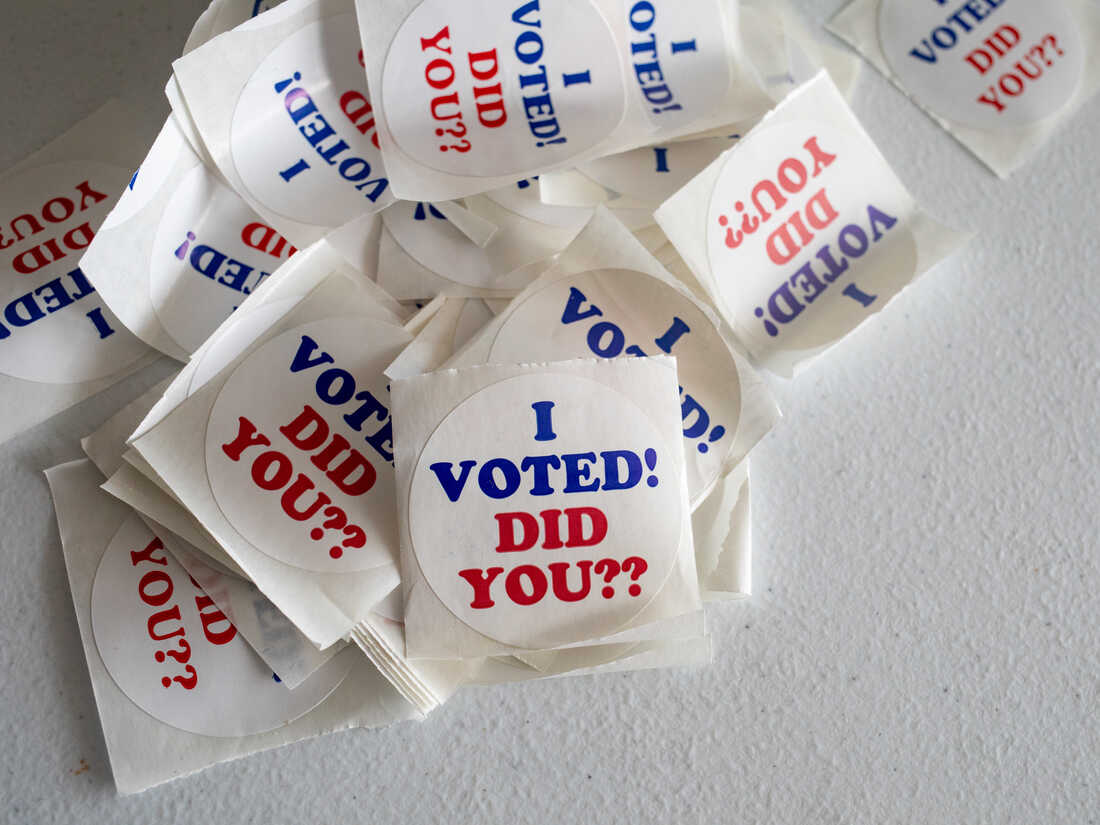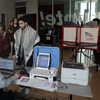
“I Voted” stickers on a table on the last day of early voting at a polling station inside Wayne County Community College Northwest Campus in Detroit on Feb. 25.
Bloomberg via Getty Images
hide caption
toggle caption
Bloomberg via Getty Images

“I Voted” stickers on a table on the last day of early voting at a polling station inside Wayne County Community College Northwest Campus in Detroit on Feb. 25.
Bloomberg via Getty Images
Both President Biden and former President Donald Trump are vying for their party’s delegates in Michigan today. Neither contest is expected to be competitive — even though the state will be pivotal in the general election come November.
Trump, who is coming off a big win in South Carolina, has one remaining major challenger. Former U.N. Ambassador Nikki Haley has vowed to stay in the race for the GOP nomination until at least Super Tuesday on March 5 — despite losing by almost 20 percentage points in her home state.
Biden’s biggest challenge in the Democratic primary, however, is not another candidate. Instead, Biden could lose a significant number of votes to the “uncommitted” option on the ballot — due to a campaign in Michigan aimed at getting people to cast protest votes against Biden for his support of Israel.
The other names on the Democratic ballot — chiefly, Biden’s remaining challenger, Democratic Rep. Dean Phillips — are unlikely to garner any meaningful support in this race. Phillips got less than 2% of the vote in South Carolina’s Democratic primary on Feb. 3, which is the last time he participated in an election contest. And self-help author Marianne Williamson, who also appears on the ballot, suspended her presidential bid earlier this month.
This is the first time Michigan holds its primaries in February. Last year — at Biden’s request — Democratic Michigan Gov. Gretchen Whitmer signed legislation moving the state’s presidential primaries from the second Tuesday in March to Feb. 27.
Who gets GOP delegates won’t be settled tonight
The shift in timing, however, complicated things for Republicans in the state.
Per Republican National Committee rules, only Iowa, New Hampshire, Nevada and South Carolina were allowed to hold primaries before March. So, in an effort to not break the RNC’s rules, Republicans in Michigan won’t be allocating the bulk of their delegates until March 2 — which is when the party plans to hold a caucus-style convention.
That means that only 16 out of the GOP’s 55 delegates in Michigan are up for grabs today. The rest of the 39 delegates will be allocated in the state party’s convention.
And that convention is going to be held during growing chaos and infighting within the Republican Party. There have been various efforts within different factions of the party to oust Michigan party chair Kristina Karamo — and replace her with Pete Hoesktra, a former congressman and former United States ambassador to the Netherlands appointed by Trump.
Karamo has refused to step down and has said only a court order would compel her to resign from her position as chair of the party. This has created a lot of confusion as the party prepares to hold a first-of-its-kind caucus in Michigan during the state convention.
Some Dems plan to be “uncommitted” to Biden
Even though Biden is expected to win the primary today, cease-fire activists in Michigan are asking people casting ballots in the Democratic primary to vote for the “uncommitted” option as a form of protest of Biden’s support for Israel.
While Democratic Rep. Rashida Tlaib of Michigan has endorsed the protest vote effort, Whitmer has not. She told CNN’s State of the Union that “any vote that’s not cast for Joe Biden supports a second Trump term.” Whitmer said that a second term for Trump would be “devastating.”
It’s hard to say how many protest votes are likely to be cast in the Democratic primary, but efforts like this could spell trouble for Biden in the fall. For one, Michigan is an important swing state that is likely to be very close.
Michigan — the Detroit area, in particular — has a very large and growing Arab American population. Biden’s support of Israel during the ongoing deadly attacks in Gaza have become a huge political liability for Biden among this voting bloc. A significant protest vote in Michigan could signal a weakness for Biden in the state come November, where even the smallest group of voters could be vital.
Either way, this is unlikely to affect Biden’s ability to lock up most — if not all — of Michigan’s 117 delegates that are up for grabs in the Democratic primary.
How Michigan votes
Michigan voters have the option of voting by mail, in person on Election Day or early in-person. New state laws have required that voters have at least nine days of early voting in statewide elections.
Already more than 1 million voters in the state have cast their ballot in the primaries as of Monday afternoon, according to Michigan Secretary of State Jocelyn Benson.
Her office said in a statement that “over 78,000 voters voted in person at an early voting site, and more than 934,000 voters have returned their completed absentee ballot to their clerk for tabulation.”
All polls will be closed by 9 p.m. ET.






